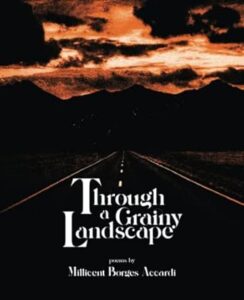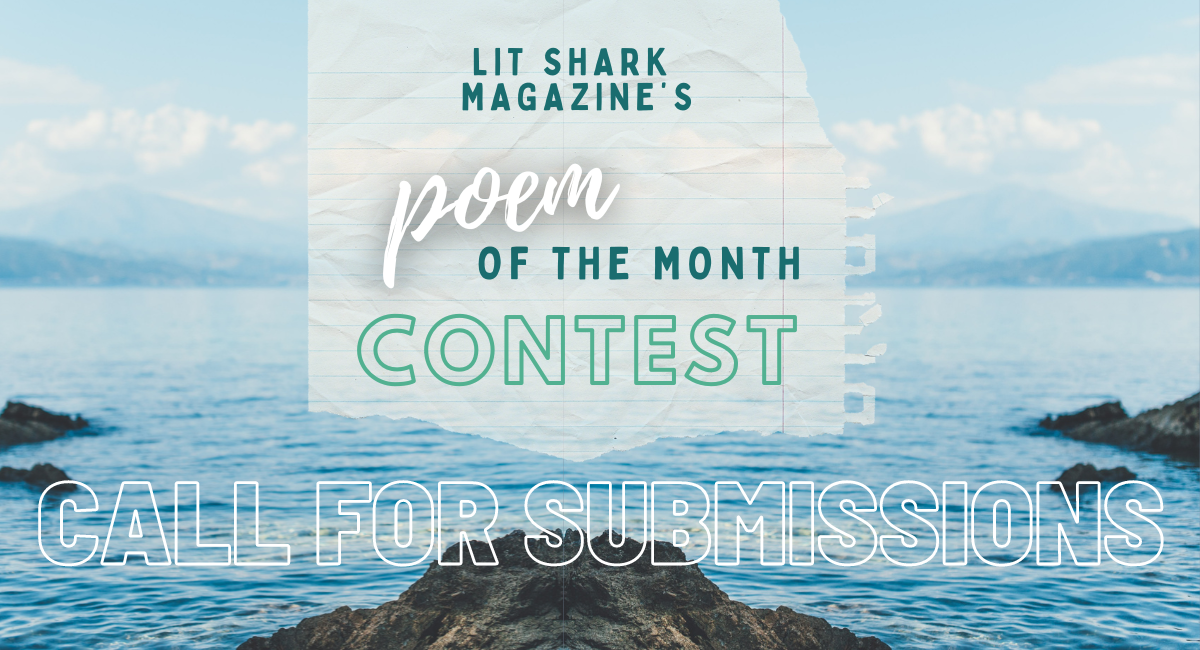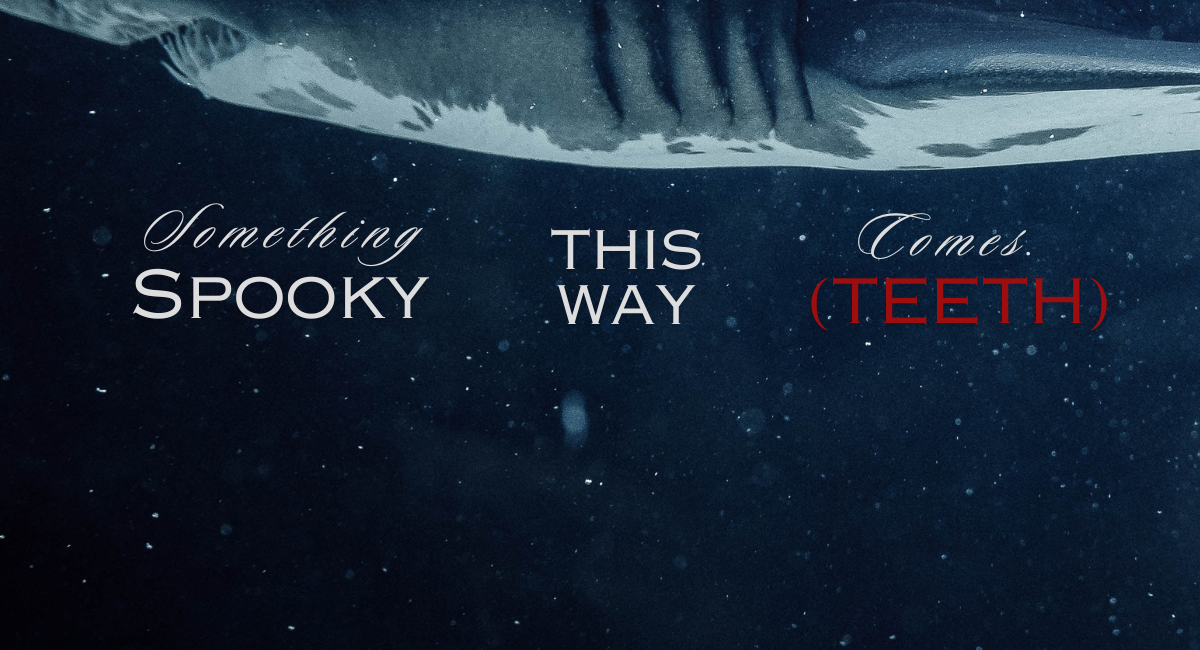Since the pandemic—I know this must be as true for others as it is for me—I’ve felt this deeper call for connection: to nature, to my family, and to myself and who I’m called to be. These are surely songs that have called all of us at various moments in our lives, but after such a lengthy stretch of silence, solitude, and social distancing, it only stands to reason that those songs would ring louder now than ever before. Poet Millicent Borges Accardi clearly heard this call within herself, as well, during the pandemic—and she answered in the form of Through a Grainy Landscape.
The poetry collection serves as a unique deep-dive into Portuguese poetry, translation, and familial ties and heritage. During the pandemic, Borges Accardi found herself turning to more Portuguese writers and reaching out to fellow writers by nurturing writing communities online. I mention this because sometimes we forget all of the work that goes on behind the writing, behind all of the words that end up on the page. But in the case of Through a Grainy Landscape, community is forged and called for from the page.
 Not only is the collection a loud call for connection, but it culminates into a beautiful coming-of-age story, a thoughtful diversification of womanhood and motherhood, and a celebration of nature. With pops of color, subtle domestic details, and surprising appearances of flowers and birds, the greatest success of these poems is created in the small, mundane moments turned beautiful through Borges Accardi’s imagery and thoughtful depictions.
Not only is the collection a loud call for connection, but it culminates into a beautiful coming-of-age story, a thoughtful diversification of womanhood and motherhood, and a celebration of nature. With pops of color, subtle domestic details, and surprising appearances of flowers and birds, the greatest success of these poems is created in the small, mundane moments turned beautiful through Borges Accardi’s imagery and thoughtful depictions.
Each poem in this collection in some way calls back to a passed family member—a late grandfather, a mother in her youth long ago, a widowed aunt—and brings with them an element of surprise, whether it’s a surprising incident or image, that sticks with the reader long after turning the page. With a vivid yellow dress and a spilled bag of groceries and much more, Borges Accardi does a beautiful job of creating vivid depictions of late loved ones and a female persona wishing to reconnect with that family—an echo of the connections we all wished for during the pandemic.
Millicent Borges Accardi also is not shy about punching the reader right in the emotions. An early poem in the collection largely set the tone for me, namely “With Eyes that Bear the Widowhood of Days,” which addresses not only widowhood and loneliness, but the slow passing of days when a person isn’t sure what to expect or look forward to next (like a lot of us during the pandemic, right?). Three lines from the poem stayed with me: “…where black glue / is the medicine of forgetting and a pause / is the known secret inside absence” (3). The silence and longing are loud in these lines, and they are carried into the poems beyond. With another poem like “Lacuna: A Blank Space or Missing Part” at the end of the collection, describing “a paradise / key where the object of longing is missing” (71), these feelings of something missing and wanting to connect are anything but subtle.
Through a Grainy Landscape is a beautiful collection that celebrates family, coming of age, and nature through the act of longing. Pairing celebration with longing may not at first seem to make sense, but it’s through this act of longing and remembering that the persona discovers what she misses most about her family and what is worth longing for. It’s details and emotional stakes like this that so many of us have felt and processed in the past few years, and having a collection like this to turn to is, both, cathartic and deeply relatable. It’s also a beautiful, accessible launching point for anyone interested in exploring more Portuguese poetry and celebrating more Portuguese-born poets.
Millicent Borges Accardi’s poetry is beautiful, thoughtful, imagistic, and connective—and it’s work I’ll be quick to turn to again and again, especially when I need to hold out a hand to a fellow poet. I hope that you’ll turn to her, as well.
You Can Purchase Your Copy of Through a Grainy Landscape Here:
Read on for our exclusive interview with poet Millicent Borges Accardi about Through a Grainy Landscape, family, poetry in translation, and her writing life.
In Conversation with Millicent Borges Accardi
McKenzie Lynn Tozan (MLT): Hi, Millicent! Thank you so much for taking some time to talk with me about your work. Through a Grainy Landscape is lovely, and I’m excited to talk about it.
MLT: I have to say right up front that this collection is stunning and so memorable. It captures that bittersweet ache and longing that so many of us have for family, especially those who grew up in a household that struggled with one thing or another (finances, etc.). How did you decide to write this collection? Did you write one poem and it turned into many that fit together, or was this a theme you knew you wanted to write to?
Millicent Borges Accardi (MBA): I had been reading poetry at a website called Poems from the Portuguese, and decided to use a few lines as prompts. Previously, I had heard the Portuguese poet, Nuno Júdice, read in Lisbon, and, in 2012, I interviewed Júdice, and later, Rosa Alice Branco and George Monteiro for the Portuguese American Journal. Along the way, I had been driven to write a Portuguese-inspired book, about heritage and my journey of connecting with my Portuguese identity.
Growing up in a multi-generational household in Long Beach there had been plenty of financial struggles—We did not have a car until I was, maybe, ten years old, and even then, it was my Dad’s car and the family car only on the weekends, so my grandmother, mom, and I spent most days walking and taking busses. My dad worked at Sears and funds were limited, I have fond memories of government cheese and government butter, waiting in lines at the Community Center for free shots. My dad’s first language had been Portuguese and he was adopted as a child by his maternal grandmother and maiden aunt in New Bedford MA, so his childhood was very poor—his feet were deformed in adulthood because he had to wear shoes that did not fit. From a young age, my dad was the wage earner, bringing in money for serving as an altar boy (at special masses like weddings where he was tipped) and doing clean up at the Boys’ Club.
MLT: Wow… Thank you so much for sharing that; it speaks so much to my next question—I loved the importance placed on family and community (including community with nature/animals) in this collection. I noticed, too, that quite a few of the poems in this collection were inspired by lines from Portuguese-American poetry, which ties in with this sense of community between writers, as well. Can you speak to the influence the community had on your writing, the topics you chose, and how you approached these poems?
MBA: As a way to deal with isolation in the early days of COVID-19, I found myself reading Portuguese authors as well as the poetry from CantoMundo fellows. When you are confined to your house, the community has to manifest in new and different ways, and that meant Zoom readings and meetings. The poetry series I curate, called Kale Soup for the Soul (Portuguese writers reading work about family food and Luso culture) and Loose Lips had to move into the virtual realm.
I was also able to connect with classrooms in Lisbon, a graduate class is translating the Gavea Brown Portuguese anthology from English to Portuguese, and my dear friend Carlo Matos and I were able to share poems and answer questions from Portuguese students in Lisbon, a feat that may not have been possible or occurred before the pandemic made Zoom and virtual exchanges more normalized.
MLT: I love that. Communities, like family, can come from anywhere we’re willing to put the effort in.
Another concept in this collection that I loved was the concept of memory and how it was indirectly addressed in the poems. Similar themes would pop up pages apart—certain groceries, an article of clothing, something specific in nature—and it was like a memory popping back up, a reminder, or an echo, even. How did you decide which order to place these poems in?
MBA: The poems were more of a piece of cloth than other collections I have written in that there were ribbons or threads, perhaps, Easter Eggs? spread throughout, images that I return back to again and again in the poetry: the color green, the sea, Sears, the old Buick Electra, bread, tomatoes, bleach and cleanser, yellow, touchstones of memory that keep me grounded.
The early quarantine was also a time of talking about the past, childhood for one reason in that those years suddenly felt quaint and safe. Being isolated together, my husband and I found ourselves getting to know each other all over again, comparing notes about 3rd-grade teachers and childhood friends. The past was like sunshine drawing out the room early every day as we felt cemented to the past.
I did free writes to prep for daily prompts, that were filled with nostalgia and weird memories that popped up from out of nowhere like how I packed cold pancakes in a paper towel and headed out on my Schwinn banana seat bike, with the neighbor Ronny to explore Bixby Park and Cherry Beach, to shot endless games of H-O-R-S-E hoops and grab Red Hots and Near Beer at the liquor store.
MLT: I love what you said about the Easter eggs and the daily prompts and how those spurred on unexpected memories. When I look back on this collection, I greatly enjoyed these poems, but I think the poems that I loved the most were the ones that focused on making small, even mundane, moments beautiful, such as “Woman in a Yellox Dress.” How do you find yourself approaching these smaller things/events that someone else might find insignificant and breathe new life/identity into them?
MBA: I focus on an image in my mind, sometimes, from a photo (long lost) or the few I have and can look at and then I place myself there, in that place, and try to imagine what was going on inside the image, who was there, what were they thinking, relatives long gone—perhaps even weirdly able to access memories better and to recall small details like a vivid dream, the blue of the hydrangeas the boiling water Margo poured on the driveway to kill the tracks of ants marching into the house, while she sang, “I Talk to the Trees but No One’s There.”
MLT: Your work—in this collection and others—contains an impressive multitude of broad, complicated themes, including family, poverty, politics, our engagement with nature… If you had to choose one, what would you say is your favorite topic to write about? What was your favorite element while composing this collection?
MBA: Hope. The notion of hope, even when it is buried deep in trauma or tragedy, is the naïve ability to find the hope inside the world during even the worst times. Mr. Rogers used to say, that during an emergency, look for “The Helpers.” The same is true for hope. Look for signs of hope, wherever they are.
MLT: There’s such a vibrant array of colors in this collection, as well—the yellow dress, “an unsuitable green,” vivid depictions of insects and flowers… They really popped off the page for me. How did you approach writing these depictions? How did you decide what to describe with such intensity and what to describe more minimally for contrast?
MBA: There’s an off-color description meant to be about prostitutes that they always accent EVERYTHING: eye shadow, lipstick, eyebrows, rouge, high heels, massive hair styles, mini-skirts, low neckline, legs—whereas non-sex workers accent ONE element like, bright lipstick. And that’s it. Although the description is super un-PC and stereotypical, I think of that detail often, in relation to writing, to poetry specifically. In that, I aim to make significant one element. Not everything. Cause everything gets muddy. And you lose focus.
Like n this example: “The Man in a Grey Flannel Suit,” and “A Man in a grey flannel suit with a red carnation in the front pocket and wearing brown shoes with white socks and carrying a Wall Street Journal as he makes his way to work at the Empire State Building in New York in the 1940s.” Which image STAYS with you? Lingers?
MLT: That makes so much sense. At the end of the collection, you speak of many of the influential Portuguese and Portuguese-American writers you referenced while writing this collection. Who would you say inspires you the most? And, if a reader were interested in specifically reading Portuguese/Portuguese-American poetry, who would you recommend they start with?
MBA: A beautiful contemporary poet is Rosa Alice Branco, her book Cattle of the Lord is breathtaking in scope and technique. Historically, two Portuguese poets to read are the poet Fernand Pessoa and the writer of the New Colossus (the poem at the base of the Statue of Liberty) Emma Lazarus. Wonderful, contemporary Portuguese-American writers include Frank Gaspar, Katherine Vaz and Sam Pereira, Carlo Matos, Paula Neves, Amy Sayre Baptista, and Darrell Kastin.
MLT: A question we get a lot is about our routines, our inspiration, and how we get the work done. What’s your routine for writing poetry like? Where else do you draw inspiration from besides fellow poets? How DO you get the work done?!
MBA: I take things as they come. Trying to keep the creativity pathway open as best as I can for as long as I can, and if and when inspiration lands on the front porch like an angelic muse, I will be able to jot it down and grab the words.
If I am listening carefully, the poems and the writing come, but I hate to feel as if I shut out the pathway so I cannot recognize the messages when they arrive. Like automatic writing (as Yeats describes). Sounds spooky, right? But that’s sort of how it happens for me. Like dreams, they’re lost unless you listen pay attention, and write them down right upon awakening.
In junior high, I did a project for the Science Fair, where I kept a dream journal and wrote down my dreams for a whole semester—at first, I barely had a few words to record, but by the end of the experiment, I was writing down ten or more dreams a night! With great detail. The more I paid attention, the more visual the dreams were. The same is true for poetry. What you feed, grows, right?
I also give myself a break. There are times when I write every day, and then there are times (long periods) when I do not write or create new work for months at a time. A period of regeneration. Instead, I spend time reading, writing book reviews, interviewing, working on grants, and preparing workshops. Mentoring. Left Brain activities. Completely different but tasks that nonetheless revolve around literature and writing.
MLT: I love all of these points so much and totally agree. What’s one tip you would like to give your younger writer self (of any age or writing stage)?
MBA: Take more chances! Do not stay safe. I moved out when I was 18 and worked three jobs waitressing to pay the rent. I came from a place of struggle and escape and I had no vision or idea that things could be different; that I could actually get more than an AA degree and work at Sears. I would tell my younger self to head to Europe and bum around on the streets, and spend money on travel. Don’t be afraid. Do not listen to the community college counselors who told me to “learn a trade” or “get married.” Major in marketing. Don’t do that (unless THAT is YOUR dream). I would tell myself, to apply to Harvard. Take the SAT. I would say, don’t kick yourself out of anywhere. Let the bouncers do it. Which means? Go on that job interview (for the job you don’t “feel” qualified for) Let THEM tell you no. Don’t tell YOURSELF no before you try.
MLT: Finally, what are you working on now? Is there anything you can share with us?
MBA: I’m working on a manuscript that is VERY loosely based on the Psalms and the concept of good and evil: for example, evil IN good and good IN evil. The gray areas where I like to dwell. Here is a poem from that work in progress. It originally appeared in Presence, “In the Way that Sinners Take”
In the Way that Sinners Take
In the way that sinners take, we
struggle against the swear and the curse,
the open-handed slap across the face
that the inevitable wall of being alone
among your fears gives you, safety
briefly, certainly not sanity or even a right
to bear sweet comfort. In the way that sinners
take us on a journey, dragged into their doubt
and the unwillingness of them to let
us in, to swear us to the truth they
deny, we carry on, packed against
what is chaff and what is wheat,
sorting through a season of what we need
to believe and what we desire for the moment.
What can we do with the time we have
fooled here, and who can benefit most
in the creation we have been easily
un-singing all to ourselves under our breath
when we start to consider what it all
means to have a divine pattern
or a source document in which to
consult when the tough lasts through
many times of choosing which weakness
we want so badly to adopt and trounce
upon, to rejoice, not in fear, but with a new
willingness to look beyond the horizon
and into just figuring out the next
of our many steps as we cut down
the brambles and sort through
our own discontent and doubt while embracing
coolly the ambition we had when jealousy
first started to speak our infinite tongue.
MLT: Thank you again for sharing your wonderful collection with me, Millicent. I really enjoyed reading it and am looking forward to sharing my review of it in Lit Shark Magazine.
And Don’t Forget to Order Your Copy of Through a Grainy Landscape!
 MILLICENT BORGES ACCARDI, a Portuguese-American poet, is the author of four poetry collections: Quarantine Highway, Through a Grainy Landscape, Injuring Eternity, and Only More So. Among her awards are fellowships from the National Endowment for the Arts (NEA), California Arts Council, CantoMundo, Fulbright, Foundation for Contemporary Arts NYC (Covid grant), Creative Capacity, and Barbara Deming Foundation, “Money for Women.” Millicent holds degrees in English and writing from CSULB and the University of Southern California.
MILLICENT BORGES ACCARDI, a Portuguese-American poet, is the author of four poetry collections: Quarantine Highway, Through a Grainy Landscape, Injuring Eternity, and Only More So. Among her awards are fellowships from the National Endowment for the Arts (NEA), California Arts Council, CantoMundo, Fulbright, Foundation for Contemporary Arts NYC (Covid grant), Creative Capacity, and Barbara Deming Foundation, “Money for Women.” Millicent holds degrees in English and writing from CSULB and the University of Southern California.






0 Comments
Trackbacks/Pingbacks